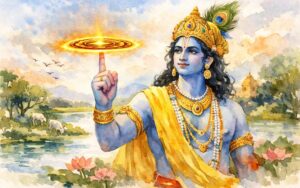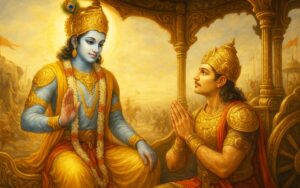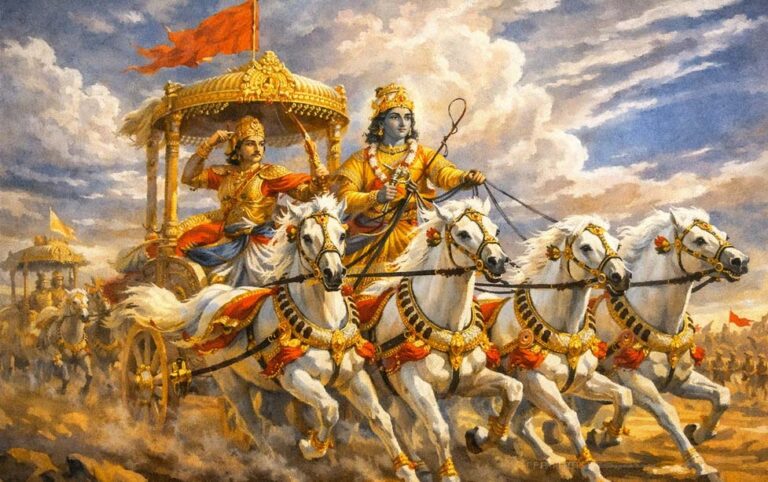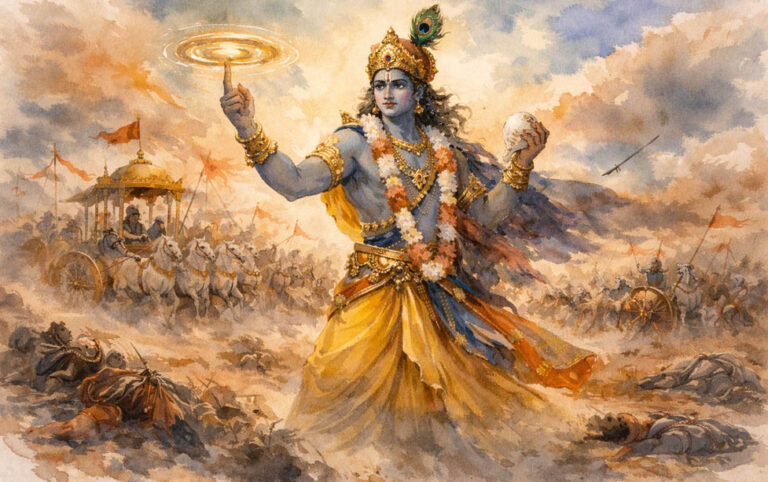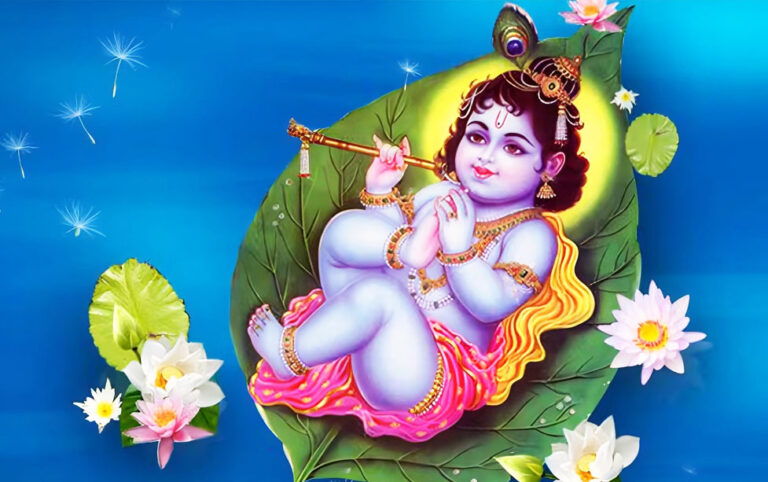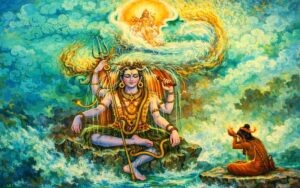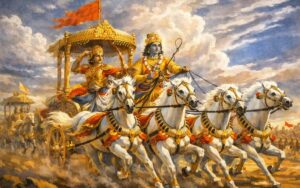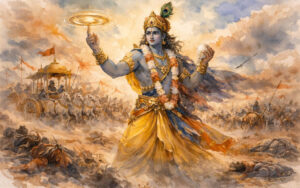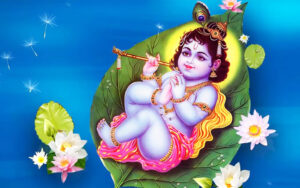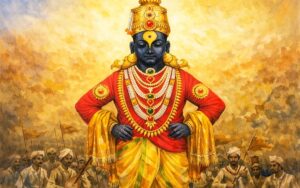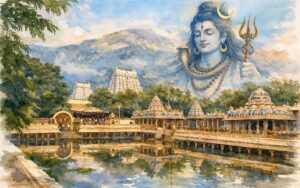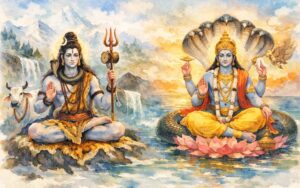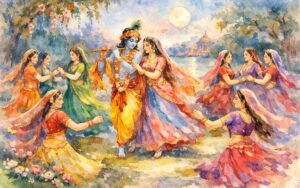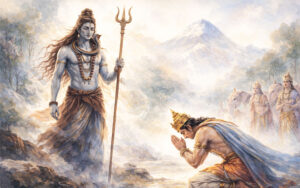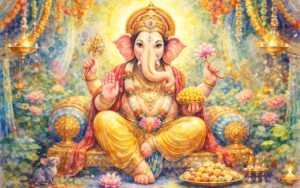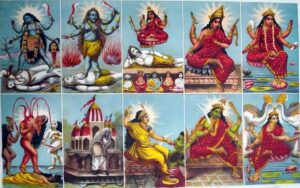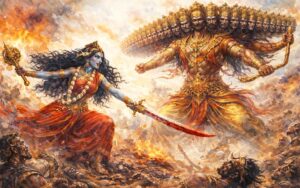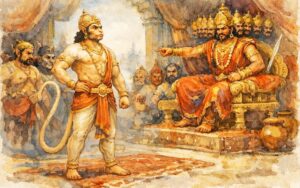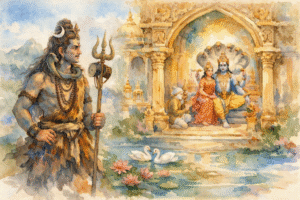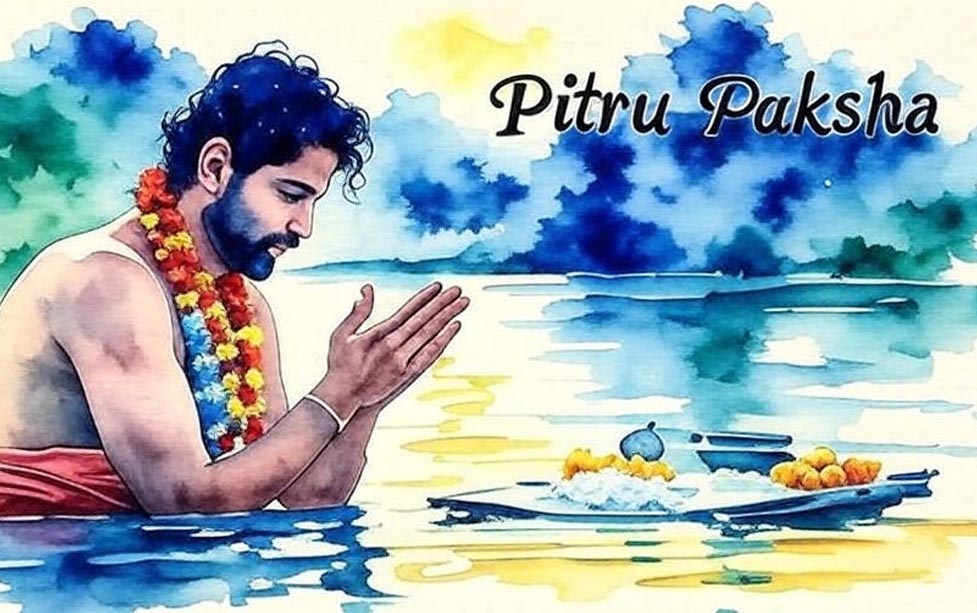
No time for reading the story? Give it a listen on Spotify.

Karna was cursed with eternal hunger in heaven because he never performed Shraddha, leading to the sacred sixteen days known as Pitra Paksha so he could return and correct his oversight.
Characters in the story:
Karna: Karna is a prominent character in Mahabharata. He is known for his valor, generosity, and tragic fate, as he was the son of the sun god Surya, but was abandoned at birth and raised by a low-caste charioteer.
![]()
Lord Yama: Lord Yama is the Hindu god of death and the ruler of the afterlife who judges the souls of the deceased and determines their fate in the next world.
Have you ever wondered about the deep-rooted reason behind the Hindu tradition of Pitru Paksha—the fortnight dedicated to ancestors? Why do millions offer food, water, and prayers specifically during this time?
The answer lies not in a abstract philosophy, but in a powerful and moving story from the great epic, the Mahabharata. It’s the tale of a great hero, his unintended oversight, and a lesson that echoes through eternity. This is the story of the legendary warrior, Karna.
The Great & Generous Karna
Karna was one of the most formidable and tragic heroes of the Mahabharata. Born to Kunti and the Sun God, Surya, he was abandoned at birth and raised by a charioteer. Despite rising to become the King of Anga and the greatest archer rival to Arjuna, he was never free from the slurs about his low birth.
But Karna had one defining, unparalleled virtue: unbounded generosity. His name is synonymous with charity—Daanveer Karna. He took a solemn vow: no one who approached him for alms would ever be turned away empty-handed.
Karna’s Death and His Journey to the Afterlife
After a life of glory and struggle, Karna met his end on the battlefield of Kurukshetra. His soul ascended to the afterlife, a realm governed by the rules of karma and dharma.
Expecting to be rewarded for his incredible generosity, Karna was granted a celestial kingdom of immense wealth and luxury. However, he soon discovered a terrible, haunting problem.
He was surrounded by mountains of gold and jewels, but he could not eat any of it.
Every time he reached for the magnificent food, it would turn into gold, stone, or dust in his mouth. He was surrounded by unimaginable wealth but was starving and parched. The great Daanveer was facing a cruel irony.
The Reason for His Torment: A Fundamental Oversight
In agony, Karna called upon Yama, the God of Death and Dharma, and asked, “Why am I being punished? I never refused anyone who asked me for anything. I gave away my greatest treasures. Why then am I denied the most basic sustenance?”
Yama, with the wisdom of cosmic law, explained the nature of his karma.
Yama said gently, “Your generosity was indeed unparalleled. You gave mountains of gold, jewels, and wealth to everyone who asked. But you made one crucial mistake.”
“You only gave what people asked for. And throughout your entire life, you never offered food or water in the name of your ancestors. You never performed Shraddha or offered Pind Daan.”
Yama explained that while Karna had donated vast material wealth, he had neglected the most fundamental debt—the Rin—that every soul owes to its ancestors (Pitris). The act of offering food and water (Anna and Jal) is a sacred duty that nourishes the souls of those who came before us, ensuring their peace and, in turn, blessing their descendants.
Karna’s charity, though magnificent, was for his own glory and fame. The selfless, duty-bound act of feeding one’s ancestors was missing from his life.
The Solution: The Origin of Pitru Paksha
Hearing this, Karna was remorseful. He pleaded for a chance to correct his error.
Touched by his sincerity, Yama granted him a boon. Karna’s soul was permitted to return to the earthly realm for a period of sixteen days. During this time, he could perform the rituals he had neglected in his lifetime: he could offer food and water in the name of his ancestors to nourish their souls and atone for his oversight.
Karna returned to the earthly plane and performed these rites with utmost devotion. He finally offered Shraddha to his ancestors, freeing them and, in doing so, liberating his own soul from the cycle of hunger and thirst.
This period of sixteen days became known as Pitru Paksha—the fortnight of the ancestors.
The Lesson We Live By Today
The story teaches us that:
All charity begins at home: Our first duty of charity is towards our own ancestors.
Intention matters: Rituals performed as a selfless duty (dharma) carry more weight than acts done for personal glory.
Nourishment of the soul is paramount: The simplest offerings of food and water, given with love and gratitude, hold more power than material wealth.
Every time we offer a Pind (rice ball) or water mixed with black sesame (Til Tarpan) during Pitru Paksha, we are not just following a custom. We are participating in a timeless tradition born from Karna’s story, ensuring peace for the souls that shaped our existence and securing their blessings for our own journey.
By remembering them, we nourish our own roots.


